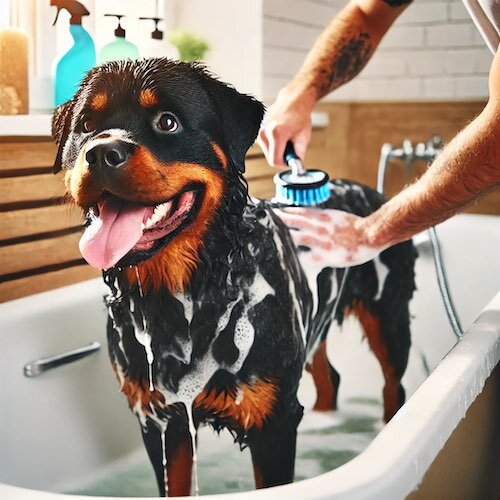
Ultimate Guide to Buying a Rottweiler: Tips, Costs, and Essential Information
Introduction
Rottweilers are one of the most distinguished and powerful dog breeds worldwide. Known for their loyalty, confidence, and protective nature, they are well-suited for families, individuals, and those seeking a devoted guard dog. However, bringing a Rottweiler into your home is a significant commitment. This guide aims to provide you with comprehensive information on buying a Rottweiler, covering tips, costs, and essential details to ensure you make an informed decision.
Search Best Products for a New Rottweiler Here
Owning a Rottweiler requires careful consideration and preparation. From understanding the breed’s unique traits to finding a reputable source, every step is crucial for ensuring a happy and healthy life for your new pet. This guide will help you navigate the process, offering insights into the breed’s temperament, health considerations, financial commitments, and the practicalities of integrating a Rottweiler into your home.
Why Choose a Rottweiler?
Temperament and Personality
Rottweilers are known for their loyalty, confidence, and protective nature. They are excellent companions, often described as calm, courageous, and intelligent. Rottweilers thrive on human interaction and are known to be great with children when properly trained and socialized, making them ideal family dogs. Their strong protective instincts also make them excellent guard dogs.
One of the most appealing aspects of Rottweilers is their ability to form strong bonds with their owners. They are often referred to as “velcro dogs” because of their tendency to stay close to their human companions. This breed is not only loyal but also highly trainable, making them suitable for various living situations, whether in a bustling city apartment or a spacious suburban home.
Rottweilers are also known for their playful and affectionate nature. They enjoy engaging in interactive play and can often be seen participating in obedience training or agility courses to delight their owners. Despite their powerful presence, Rottweilers are not overly demanding, which makes them a great choice for individuals who appreciate a balance of activity and relaxation.
Physical Characteristics
Rottweilers are large-sized dogs with a robust and muscular build. They typically weigh between 80-135 pounds and stand about 22-27 inches tall at the shoulder. Their distinct black and tan coats, strong jaws, and expressive eyes give them a powerful and imposing look. Rottweilers have a short, dense coat that is easy to maintain.
The breed’s physical characteristics are not only impressive but also functional. Their size and strength make them excellent companions for protective roles, and their coat is designed to withstand various weather conditions. Regular grooming is required to maintain their coat, but their overall care needs are manageable for most dog owners.
Rottweilers have a distinctive appearance that sets them apart from other breeds. Their expressive eyes convey a range of emotions from curiosity to affection. The signature black and tan coat is not just a visual trait but also an integral part of their charm, giving them a regal and commanding presence.
Health and Lifespan
On average, Rottweilers live for about 8-10 years. While generally healthy, they are prone to certain health issues, particularly related to their breed characteristics. Common health concerns include hip dysplasia, elbow dysplasia, and certain cancers. Regular veterinary check-ups and a healthy lifestyle can help manage these risks.
Prospective owners should be prepared for the potential health challenges that come with owning a Rottweiler. Regular vet visits are essential to monitor their health and address any issues early on. Maintaining a healthy diet and ensuring proper exercise can also contribute to a longer, healthier life for your Rottweiler.
Rottweilers can also be prone to allergies and skin conditions. Regular grooming and proper nutrition can help manage these conditions and keep their coat and skin healthy. Despite these potential health concerns, with proper care and attention, Rottweilers can lead happy and fulfilling lives.

Cost of Buying a Rottweiler
Initial Purchase Price
The cost of purchasing a Rottweiler can vary widely based on factors such as location, breeder reputation, and pedigree. On average, you can expect to pay between $1,500 and $4,000 for a Rottweiler puppy from a reputable breeder. Show-quality Rottweilers or those with exceptional pedigrees can cost significantly more, sometimes reaching up to $8,000 or more.
It’s important to understand that the initial purchase price is just the beginning of your financial commitment. When buying from a breeder, the cost can be influenced by the breeder’s reputation, the dog’s lineage, and whether the dog is intended for show or as a pet. Higher prices often reflect a higher quality of care and breeding practices, which can mean fewer health problems down the line.
Additionally, some breeders may include initial veterinary care, vaccinations, and microchipping in the purchase price. It’s essential to ask for a breakdown of what is included in the cost to avoid any surprises.
Breeder vs. Adoption
While buying from a breeder is a common route, adopting a Rottweiler from a rescue organization can be a rewarding and cost-effective alternative. Adoption fees typically range from $200 to $500, which often includes vaccinations, spaying/neutering, and a health check.
Adoption can be a wonderful way to provide a home to a dog in need. Many Rottweilers in rescues are there through no fault of their own, often due to changes in their owner’s circumstances. By adopting, you not only save a life but also support the efforts of rescue organizations dedicated to the welfare of these animals.
Adopting from a rescue can also be less expensive than buying from a breeder. However, it’s important to be aware that rescue dogs may come with unknown histories and potential behavioral or health issues. Many rescue organizations provide support and resources to help new owners with these challenges, ensuring a smooth transition.
Hidden Costs
Beyond the initial purchase or adoption fee, there are several hidden costs to consider:
- Veterinary Care: Regular check-ups, vaccinations, and emergency care. Rottweilers are prone to certain health issues, so it’s essential to budget for ongoing veterinary expenses.
- Insurance: Pet insurance to cover medical expenses. Given the breed’s potential health issues, insurance can be a wise investment to mitigate unexpected costs.
- Supplies: Bedding, toys, grooming tools, and food. High-quality supplies contribute to your dog’s overall well-being and comfort.
- Training: Professional training sessions if needed. While Rottweilers are generally well-behaved, training can help address any behavioral issues and ensure your dog is well-mannered.
- Grooming: Regular grooming, especially for nail trimming and ear cleaning. Although Rottweilers have manageable grooming needs, regular maintenance is necessary to keep them healthy.
Other potential costs include pet sitting or boarding services if you travel, as well as potential home modifications to accommodate your new pet. Being financially prepared for these expenses ensures that you can provide the best care for your Rottweiler without unexpected financial strain.
Finding a Reputable Breeder
How to Identify a Good Breeder
A reputable breeder prioritizes the health and well-being of their dogs. Look for breeders who:
- Allow you to visit their facility and meet the puppies’ parents: This transparency ensures that the breeding environment is clean and the dogs are well-cared for.
- Provide health clearances for the puppy’s parents: Health clearances demonstrate that the breeder tests for genetic conditions common in the breed.
- Have a clean and well-maintained breeding environment: A clean environment reduces the risk of disease and indicates a high level of care.
- Are knowledgeable and willing to answer all your questions: A good breeder will be eager to educate you about the breed and address any concerns.
A reputable breeder will also be interested in you as a potential owner, ensuring that their puppies go to responsible and loving homes. They may ask about your experience with dogs, your lifestyle, and your plans for caring for a Rottweiler.
Questions to Ask a Breeder
When interacting with potential breeders, consider asking the following questions:
- Can I see the parents and their health records?: Seeing the parents can give you an idea of the puppies’ potential size, temperament, and health.
- What socialization practices do you use for the puppies?: Early socialization is crucial for a well-adjusted dog. Ask about how the puppies are exposed to different environments, people, and experiences.
- Do you offer a health guarantee?: A health guarantee shows that the breeder stands behind the health of their puppies. Understand the terms and duration of the guarantee.
- Can you provide references from previous buyers?: Talking to previous buyers can give you insights into the breeder’s reputation and the health and temperament of their dogs.
Red Flags to Avoid
Be cautious of breeders who:
- Refuse to let you visit their facility: Lack of transparency can indicate poor breeding conditions or hidden issues.
- Do not provide health clearances or documentation: Without health clearances, you cannot be sure of the health status of the puppies’ parents.
- Have multiple litters available at once: High volume breeding can indicate a puppy mill, where the primary focus is profit rather than the health and well-being of the dogs.
- Offer puppies at unusually low prices: Extremely low prices can be a red flag for unethical breeding practices or poor health conditions.
Avoiding these red flags can help you find a responsible breeder who prioritizes the health and well-being of their dogs. A reputable breeder will also be a valuable resource for advice and support as you raise your Rottweiler.

Adoption Considerations
Benefits of Adoption
Adopting a Rottweiler comes with several benefits:
- Saving a Life: Giving a homeless dog a second chance. Many rescue dogs have been abandoned or surrendered due to circumstances beyond their control.
- Lower Cost: Adoption fees are generally lower than purchasing from a breeder. These fees typically include vaccinations, spaying/neutering, and initial health checks.
- Pre-trained Pets: Many rescue dogs are already house-trained and socialized. This can make the transition into your home smoother and reduce the time and effort needed for training.
In addition to these benefits, adopting a dog can provide emotional rewards. Knowing that you have given a dog a loving home can be a deeply fulfilling experience. Many adopters report that their rescue dogs show immense gratitude and loyalty.
Finding Rescue Organizations
Several organizations specialize in rescuing Rottweilers. Websites like Petfinder, Adopt-a-Pet, and local breed-specific rescues can help you find a Rottweiler in need of a home. Ensure that the rescue organization is reputable and has a thorough adoption process.
When choosing a rescue organization, look for those that have a rigorous screening process for potential adopters. This indicates that they care about the well-being of their dogs and want to ensure they go to suitable homes. Many rescues also provide support and resources for new owners, helping you navigate any challenges you may encounter.
What to Expect When Adopting
Adopting a Rottweiler may come with challenges, especially if the dog has had a difficult past. Be prepared for an adjustment period and consider seeking professional training or behaviorist support if needed. Patience and understanding are key to helping your new pet settle into their forever home.
When adopting, you may encounter dogs with a range of backgrounds and experiences. Some may have been surrendered due to behavioral issues, while others may have been abandoned or rescued from neglectful situations. It’s essential to approach the adoption with an open mind and a willingness to work through any issues that arise.
Building trust with your adopted Rottweiler can take time. Consistent routines, positive reinforcement, and a calm environment can help your new pet feel secure. Many rescue organizations offer post-adoption support, including training resources and access to behaviorists, to assist with the transition.
Preparing for Your Rottweiler
Essential Supplies
Before bringing your Rottweiler home, gather the necessary supplies, including:
- Crate and Bedding: A comfortable and safe space for your Rottweiler. Crate training can provide a sense of security and aid in housebreaking.
- Food and Water Bowls: Stainless steel or ceramic bowls are ideal. These materials are durable and easy to clean.
- High-Quality Dog Food: Appropriate for their age and health needs. Consult your veterinarian for recommendations.
- Collar, Leash, and ID Tags: For walks and identification. Microchipping your dog is also recommended.
- Toys and Chews: To keep them entertained and promote dental health. Choose toys that are safe and durable, as Rottweilers can be enthusiastic chewers.
Having these supplies ready before your new Rottweiler arrives ensures that you can provide a comfortable and welcoming environment from day one.
Home Preparation
Prepare your home to ensure a safe environment for your new pet:
- Puppy-Proofing: Remove any hazardous items and secure loose wires. Rottweilers are curious and may chew on things they shouldn’t.
- Safe Spaces: Create designated areas for eating, sleeping, and playing. This helps your dog feel secure and understand where they can go.
- Temperature Control: Rottweilers are sensitive to extreme temperatures, so maintain a comfortable indoor climate. Avoid leaving them in hot or cold environments for extended periods.
Setting up your home to accommodate a Rottweiler’s needs can prevent accidents and help your new pet settle in more comfortably.
Puppy-Proofing Your Home
To prevent accidents and injuries, puppy-proof your home by:
- Keeping small objects out of reach. Rottweilers can be inquisitive and may swallow items they shouldn’t.
- Blocking off areas where your Rottweiler could get stuck. Use baby gates to restrict access to unsafe areas.
- Using baby gates to restrict access to unsafe areas. This is especially important for staircases and rooms with potential hazards.
By taking these precautions, you can create a safe and welcoming environment for your new Rottweiler, ensuring their well-being and reducing the risk of accidents.
Bringing Your Rottweiler Home
First Day at Home
The first day with your new Rottweiler is crucial for establishing a bond. Keep things calm and allow your Rottweiler to explore their new environment at their own pace. Provide plenty of positive reinforcement and comfort.
Bringing a new pet into your home is an exciting experience, but it’s essential to approach it with patience. Allow your Rottweiler to explore their new surroundings and become familiar with the sights, sounds, and smells of their new home. Offer treats and gentle praise to reinforce positive behaviors and help them feel secure.
Establishing a Routine
Dogs thrive on routine, so establish a consistent schedule for feeding, potty breaks, and playtime. This helps your Rottweiler feel secure and understand what to expect each day.
Consistency is key to helping your Rottweiler adjust to their new home. Set specific times for meals, walks, and bedtime to create a predictable routine. This not only helps with housebreaking but also provides a sense of stability and security for your dog.
Socialization and Training
Early socialization is essential for a well-behaved Rottweiler. Introduce your puppy to various people, animals, and environments to build their confidence. Basic obedience training should start early, focusing on commands like sit, stay, and come. Positive reinforcement methods work best with Rottweilers.
Socialization should begin as soon as your Rottweiler is comfortable in their new home. Expose them to different people, sounds, and experiences in a controlled and positive manner. Enroll in a puppy socialization class if possible, as this provides structured interactions and guidance from a professional trainer.
Training should be approached with patience and consistency. Use positive reinforcement techniques, such as treats and praise, to encourage desired behaviors. Avoid harsh corrections, as Rottweilers are sensitive and respond better to gentle guidance. Regular training sessions can also strengthen the bond between you and your dog.

Health and Wellness
Common Health Issues
Rottweilers are prone to certain health issues, including:
- Hip Dysplasia: Abnormal development of the hip joint. This condition can lead to pain and mobility issues. Regular exercise and maintaining a healthy weight can help manage the risk.
- Elbow Dysplasia: A similar condition affecting the elbows. Regular check-ups and maintaining a healthy weight are crucial.
- Heart Problems: Rottweilers can be prone to heart conditions such as subvalvular aortic stenosis (SAS). Regular vet check-ups can help detect and manage heart issues early.
- Allergies: Skin allergies that can cause itching and discomfort. Common allergens include certain foods, environmental factors, and flea bites. Regular grooming and a balanced diet can help reduce the risk of allergies.
- Cancers: Rottweilers have a higher risk of developing certain cancers. Early detection and treatment are crucial for managing these conditions. Regular check-ups with your vet can help catch and treat cancers early.
Preventive Care
Regular veterinary check-ups are essential to catch potential health issues early. Keep up with vaccinations, parasite control, and dental care. Monitoring your Rottweiler’s weight and activity levels can also help prevent obesity-related problems.
Preventive care is crucial for maintaining your Rottweiler’s health. Schedule annual vet visits for comprehensive health checks and vaccinations. Regular dental care, including brushing your dog’s teeth and providing dental chews, can prevent dental disease. Parasite control, such as flea and tick prevention, is also essential to keep your dog healthy.
Diet and Nutrition
A balanced diet is crucial for your Rottweiler’s health. Choose high-quality dog food that meets their nutritional needs. Avoid overfeeding and provide appropriate portion sizes to maintain a healthy weight. Consult your veterinarian for specific dietary recommendations based on your dog’s age, weight, and health status.
Nutrition plays a vital role in your Rottweiler’s overall health and well-being. High-quality commercial dog food formulated for large breeds is a good choice. Avoid feeding table scraps or foods that can be harmful to dogs, such as chocolate, grapes, and onions. Monitor your dog’s weight and adjust their food intake as needed to prevent obesity.

Ongoing Care and Maintenance
Grooming Needs
Rottweilers have minimal grooming needs due to their short coats. However, regular grooming helps keep them clean and healthy. Brush their coat weekly to remove loose hair and reduce shedding. Pay special attention to cleaning their ears to prevent infections.
While Rottweilers do not require extensive grooming, regular maintenance is still necessary. Weekly brushing helps remove loose fur and keep their coat looking healthy. Clean their ears with a damp cloth to prevent bacteria buildup and infections. Regularly check and trim their nails to prevent overgrowth and discomfort.
Exercise Requirements
Rottweilers are highly active and need regular exercise to stay healthy. Daily walks, play sessions, and activities such as running or hiking are beneficial. Ensure they get enough physical and mental stimulation to prevent boredom and destructive behaviors.
Regular exercise is essential for maintaining your Rottweiler’s physical and mental health. Aim for at least an hour of exercise per day, including walks, playtime, and interactive games. Rottweilers enjoy activities that challenge their minds and bodies, such as obedience training and agility courses. Exercise helps keep them fit and prevents obesity-related health issues.
Mental Stimulation
Mental stimulation is essential to prevent boredom and destructive behaviors. Provide puzzle toys, interactive games, and training sessions to keep your Rottweiler’s mind engaged. Regular socialization with other dogs can also provide mental and emotional benefits.
Rottweilers are intelligent dogs that thrive on mental challenges. Provide a variety of toys that encourage problem-solving, such as treat-dispensing puzzles. Engage in regular training sessions to teach new commands and tricks. Socialization with other dogs and exposure to new environments can also provide valuable mental stimulation.
Conclusion
Bringing a Rottweiler into your home is a rewarding experience that comes with unique challenges and responsibilities. By understanding their needs, finding a reputable breeder or rescue organization, and preparing your home, you can ensure a smooth transition for your new furry friend. With proper care, training, and love, your Rottweiler will be a loyal and delightful companion for years to come.
Owning a Rottweiler is a commitment that requires time, effort, and financial resources. However, the joy and companionship they bring can be immeasurable. By educating yourself about the breed and preparing for their arrival, you can provide a loving and nurturing environment for your Rottweiler. With the right care, your Rottweiler will thrive and become an integral part of your family.
